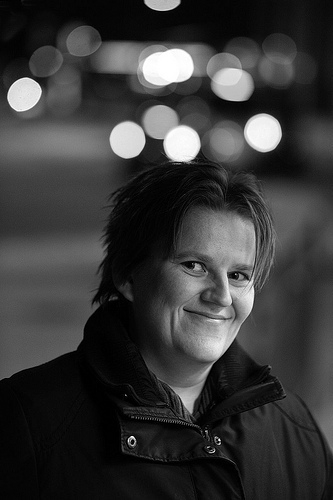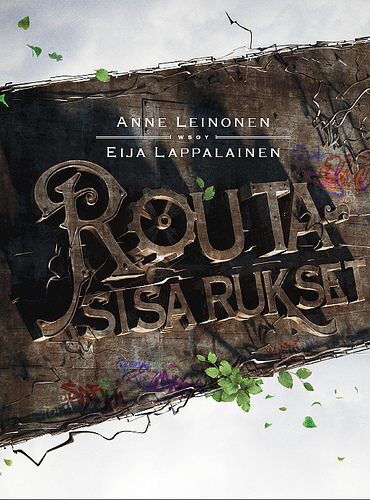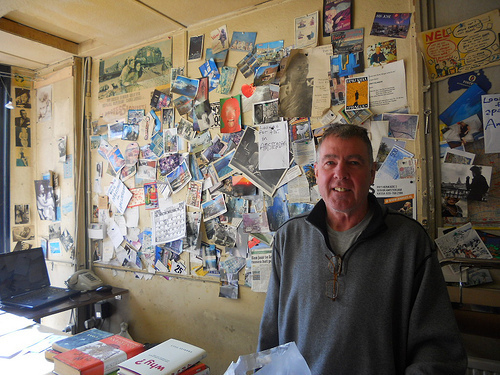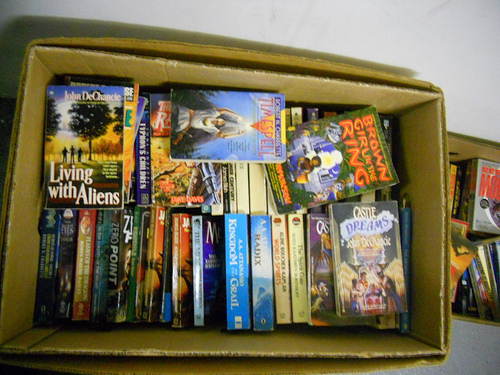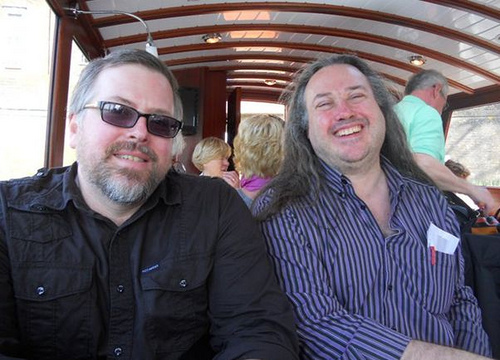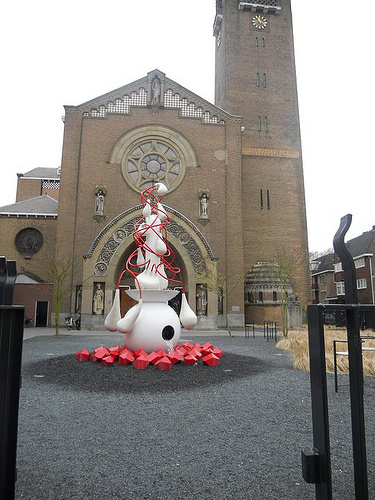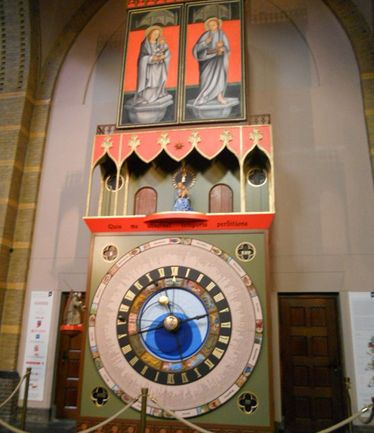Jeff VanderMeer's Blog, page 62
May 9, 2011
Finnish Fiction: An Interview with Anne Leinonen
A writer and editor also active in the Finnish SF/Fantasy community, Anne Leinonen has coauthored several books for young people with Eija Lappalainen. Leinonen's short fiction has won multiple awards. The story "The Othering" won the Atorox Prize, the oldest SF/F prize in Finland, and can be read in English in Usva International 2007 (starting on page 25).
In 2006 Leinonen published a story collection, White Threads: Stories From Other Realities. Vesa Sisättö, the critic of the largest Finnish newspaper, Helsingin Sanomat, described the collection as dealing with the theme of "crossing of the borders of different worlds. Often the main character is escaping or hoping to escape from a narrow minded society or troublesome situation. Limits also contain the borders between one's own body and the rest of the world or life and death." Leinonen also has served as the editor-in-chief of the online magazine Usva, which publishes Finnish speculative fiction, and her latest collaboration with Lappalainen, Routasisarukset, has just been published in Finland. Routasisarukset is a Finnish dystopian novel in a vein similar to the works of Ursula K. Le Guin.
My wife and I met Leinonen at the Writer's House at the University of Jyväskylä in April, and had a chance to talk with her about Finnish SF/Fantasy, her own work, and Finnish fandom. The email interview below followed up on that conversation…
What is the state of Finnish SF/F today, in your opinion?
Finnish science fiction and fantasy is living its golden age. In this century the numbers of the writers has significantly risen, as well as the general respect towards the genre. Even the mainstream writers use fluently the motives and themes of speculative fiction. The borders between the genres have blurred, bringing new methods, paths, and forms of expression to our literature. After a long period of realism—that has concentrated/focused mainly in the issues such as the events of the WWII or everyday life—the scale of expression has expanded. Fantastic and everyday life intertwine, reality gets twisted describing the vastly changing experiences of individuals.
Are there areas of special emphasis in Finnish SF/F in terms of what is published?
In Finland all areas of fantastic are well covered, but the amount of "hard SF" has remained small in literature. Copying Anglo-American ideas or styles has changed; the use of local and national elements has become natural part of storytelling. Especially nature is used as a strong element, sometimes taking the role of the main character. The Runeberg Prize for fiction went this year to a collection of short stories by Tiina Raevaara, [in which] she wrote about alternative realities. I would compare Tiina Raevaara's work to Leena Krohn's and recommend her warmly.
How would you describe your own approach to fiction
I often use lightly speculative fiction as an ingredient in my works. I like to use Finnish folklore, always striving towards my own interpretation of it. Especially I am interested of the sociological analyses: conflicts between the individual and the society. In my works the characters often end up in confronting difficult choices. What I do like to do is to blur the genre divisions.
Style and substance walk hand in hand in my works; I aim for careful and detailed description, as well as combining the macro- and micro-level events of the story. I have searched out different influences from different sources; for example, from the works of Greg Egan, Simon Ings, Haruki Murakami and Margaret Atwood….
What issues are foremost on your mind at the moment, as a writer?
The field of the publishing in Finland is under a serious changeover. My publishing company—the oldest and previously the most respected one—was just sold to Sweden. Now I have to consider how to choose a possible new publisher; where to get the most professional support for publishing SF and Fantasy and how to find the best qualified editors. On the other hand there are still many possibilities through new small and specialized publishing houses. However, most important is the text: what to write, what worlds one wants to explore. What I want is to dive deeper into the world I am creating, the place that allows speculation to hint—not to explain. I want to trust the readers, their abilities of interpretation.
In closing, can you describe for us your latest book, the collaboration with Eija Lappalainen titled Routasisarukset (The Frost Children)?
The main character of the novel, Utu, was adopted by the Valley people when she was only two years old; she is "different". She questions the conventions of the society and has a strange ability to understand the ancient abandoned machines. When her foster father Booris tries to saddle her with the first-born's responsibility for the family, Utu decides to run away and to find her beloved, and also to unravel the mystery of her own biological origin.
Is this the beginning of a series?
Yes, it's the first volume of a treatment of individual liberties, constricting power structures, the continuity of life and the possibilities of biotechnology. It starts a dystopian action trilogy; it has adventure and love triangles, twists with "techno-hi-fi", but it also debates the questions about our origins (genes vs. social relationships/ surroundings); lust for power (why do people who intend to do good end up doing bad things?); and how to keep faith with one's own values, continuity of life, and humanity in general.
Finnish Fiction: An Interview with Anne Leinonen originally appeared on Ecstatic Days on May 9, 2011.




May 8, 2011
The Book Exchange in Amsterdam
On our last full day in Amsterdam, Ann and I wound up buying more books than we'd planned on—and it was almost entirely the fault of The Book Exchange, a great used bookstore on Kloveniersburgwal. We didn't have much time, so I immediately went downstairs to the SF/F section to see if they had any out-of-print fiction anthologies. Even if you're in a rush, it's easy enough to go through anthos. Sure enough, they did. Photos below the cut.

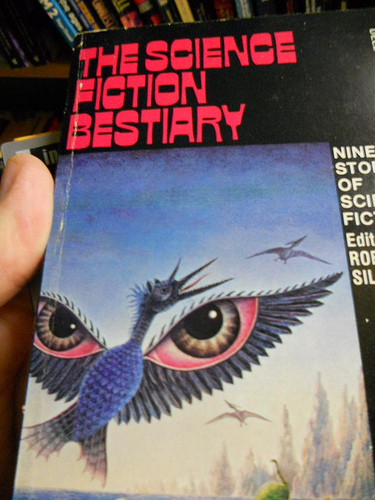
(How were we supposed to pass this one up?!)
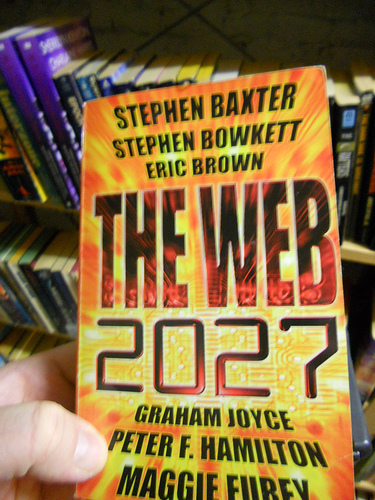
(Oh dear. The web in 2027, as imagined in the 1990s You know that's gonna get ugly.)
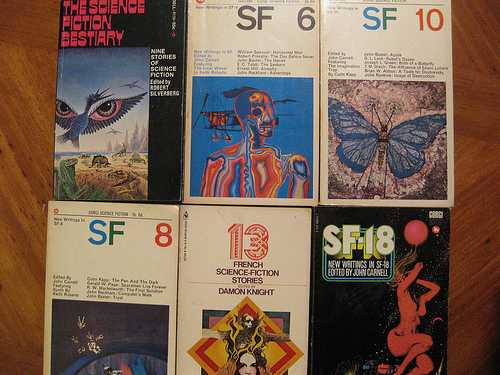
(Part of our catch, documented. Some crazy covers.)
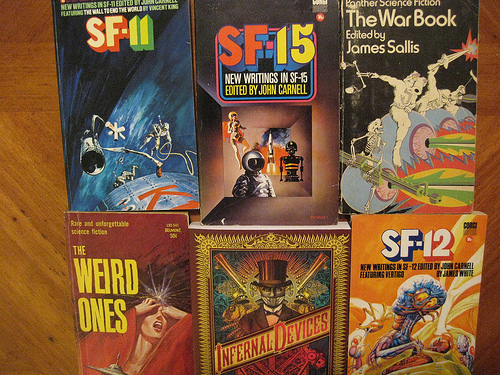
(Note the Sallis antho…wait. How the heck did Infernal get in there?!)
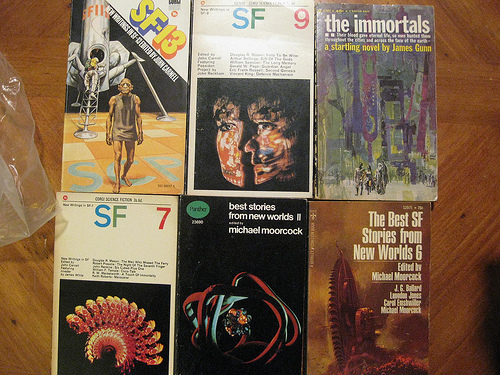
(You gotta have some New Worlds in there…)
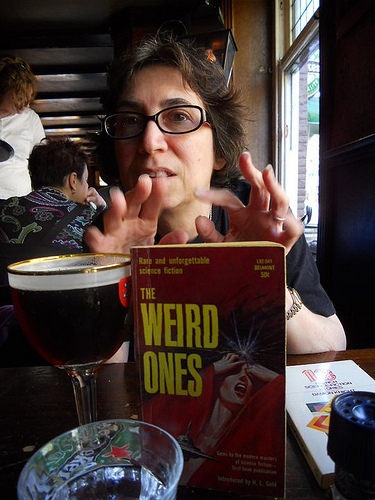
(Afterwards, we went to a nice, quiet pub and looked through our books, and conjured things with them…)
The Book Exchange in Amsterdam originally appeared on Ecstatic Days on May 8, 2011.




May 7, 2011
Finnish Fiction: Viivi Hyvonen on "The Monkey and the New Moon"
[image error]
Viivi Hyvonen's latest novel, the title of which translates as "The Monkey and the New Moon," has gotten a lot of critical praise in the author's native Finland. It was also talked up to us during our recent trip to Finland by, among others, Jukka Halme, who called it an excellent example of New Weird fiction. I've now read the 18,000 words of the novel that exist in an English translation, and I have to say I find the story fascinating. It's energetic, intelligent, and at times darkly funny. What's the novel about? I'll let Hyvonen describe it, to kick off a short interview with her…
In the permanently quarantined city of Dystopolis between an unnavigable, poisonous ocean and an impassable dump inhabited by frenzied monkeys, a suspiciously monkey-like baby boy is found on a doorstep and adopted by a former jazz singer, who names him Hanuman after a monkey god. Confined to her attic apartment during the days, in the nights he roams the rooftops, while down on the streets tango and jazz gangs rule and listening to the wrong kind of music can get you killed. After a restless and violent youth in a city run by organized crime and a foreign police force, Hanuman manages to carve himself a niche and make a living as a private detective, until one day he receives three interconnected commissions. One is from three trench-coated strangers who claim to come from the outside, one from a hunted scientist who claims to have returned from the outside, and one from a tango singer called Luna who bears a disturbing resemblance to Hanuman's now deceased grandmother. While Dystopolis is on the verge of a civil war as the children of several criminal leaders are found murdered, Hanuman sets out to solve some mysteries of his own in addition to those of his commissioners, and in so doing joins a dangerous game where his own life and Luna's are not the highest stakes.
[image error]
You've translated part of your latest novel into English. What was that process like? Did the book seem to change as a result?
The process was painstaking at best. I've read mostly in English since my early teens but haven't actively used the language since high school. Even though I have a reasonably large passive vocabulary, it can get rather frustrating when I'm absolutely positive there's a certain word or expression that I'm looking for but can't find it in a dictionary. I've always gotten there in the end, though. I don't think the book changed as a result, or at least hope it didn't. One of the things about translating into or writing in a language other than your native one is that you can't trust your sense of style entirely. I hate that.
What has the reader response been like to your most recent novel? How has it affected how you view your book?
This question in actually related to the previous one, because I've got a lot of positive feedback on my Finnish. Once a professional linguist complemented me and asked if I put a lot of effort into the language. I do, and am flattered that someone takes notice—and a little humiliated as I find my English skills lacking. Another response I've heard repeatedly is that people have read or intend to read it a second time, which is what I do if I truly love a book (for me the best of books are those that both withstand and demand several reads). All in all, the response has been very rewarding, since I had a hard time getting the novel published in the first place and, I have to admit, almost lost faith at times.
Who are your main influences?
Concerning my most recent novel, the two books I was most influence by were probably Dracula by Bram Stoker and Miss Smilla's Feeling for Snow by Peter Hoeg. While still in high school, I had seen the film Dracula by Fancis Ford Coppola and been very impressed. When I went on to read the book, though, I was surprised to discover it to be an epistolary novel. The form intrigued me and I decided that I wanted to write a book consisting of diary entries, letters and so forth—and make it absorbing. Hoeg's book, on the other hand, is a thriller and very exiting even though it isn't chronological, another structural aspect I wanted to try out.
I was also influenced by several movies with artificial realities that their inhabitants are unaware of: Matrix (world as a computer program), Dark City (world as an alien experiment) and Truman Show (world as a TV-series). I realized this hadn't been done with books, i.e. a world, or in my case a city, as a milieu for literature. As a matter of fact, the world of my novel could be seen as a landscape of my own mind, as it contains allusions to a number of things that were important to me while growing up: classical mythology, such children's classics as Peter Pan, Alice in Wonderland and The Wizard of Oz, graphic novels like Corto Maltese etc.
Generally speaking, I've been most influenced by authors like Ursula K. Le Guin, Robert Holdstock, William Gibson, Neil Gaiman, Salman Rushdie and Gabriel Garcia Marquez.
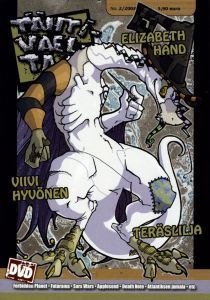
What issue or issues are you grappling with right now as a writer, either about craft or being a writer, or anything else?
Because I started out so young, I effectively built my identity around writing—not surprisingly, themes of identity are central in all my work. As writing was something everyone has expected me to do with my life, I've needed to take distance from it at various points. The first one must have been when I realized Finnish is a language with only 5 million speakers (and potential readers) and in Finland speculative fiction is as a marginal genre as anywhere else. As it didn't seem feasible for me to make a living out of writing what and how I wanted to, I decided I needed a day job where I wouldn't have to worry too much about money or employment and might be able to work part time. Thus I went to study medicine and wrote my most recent novel over the time of several years—one of the issues I'm grappling right now is trying to be creative on a regular basis instead of whenever I feel like it, as I am working as a doctor only three days a week in order be able to write more.
When I started I was too young to be interested in authors instead of just books. (I was twelve when I began my first novel, fourteen when it was released.) For me writing didn't use to be a social hobby but originally a way to channel ideas and emotions I found difficult to otherwise express. At times the attention I get for my writing can be confusing for me, and I'm still surprised whenever I get together with other authors, that, hey, there's actually other people doing this, too. A certain yearning for attention and approval is typical of me but not a characteristic that I'm particularly proud of, so over the years I've tended to question my own motives to write. I've come to understand, however, that even though the attention part isn't something I really need, I do need to write in order to thrive, and if somebody else is getting something out of it, I'm glad. This might seem like a rather painstaking way to decide to be a writer after all, but that's the way my mind works: the pressure needs to build up and the discomfort grows until I finally reach a decision–and commit myself to it
Finnish Fiction: Viivi Hyvonen on "The Monkey and the New Moon" originally appeared on Ecstatic Days on May 7, 2011.
May 5, 2011
Joanna Russ and The Weird
I was thinking the other day about Joanna Russ, both because of her passing and because Ann and I had read so much of her short fiction while making decisions on stories for our The Weird anthology (Atlantic, November). I'd been absolutely stunned by the sheer quantity of the quality, because certain stories get reprinted over and over and this had created an assumption in my mind of why the others might not have reprinted…Wrong. And someone needs to do an omnibus. Right. Now. These stories are by turns horrifying, hilarious, eccentric, dangerous, comforting, and riotously good fun…and, yes, serious. They need to be returned, en masse, to the mainstream of SF and Fantasy reading, in the most accessible formats possible.
As importantly, in the rest of our reading for The Weird, Russ's work helped me to appreciate other authors, both in the context of a general tradition of strange fiction and also a tradition of women's fiction, especially from the 1970s and 1980s. In that latter vein, for example, Russ in combination with Shirley Jackson made me appreciate Kelly Link even more. (Although I'd not presume to claim those influences on Link's behalf.)
I don't have anything that profound to say about Russ—I think a lot of people have said much more interesting and personal thiings already. But I was happy to have a chance to engage with her fiction again, and happy it was in the context of The Weird and so many other fine authors–and that even reading so many stories (probably about four to five million words of fiction to get to our 750,000 words), her work stood out.
We're not quite ready to reveal the entire 100-plus stories in The Weird, but I thought I'd give a sneak peek of a brief selection of the fiction by women in our anthology from before and after our Russ selection. This is only one context in which Russ or any of these writers can be seen, of course—in the anthology as a whole they and their stories tie in to many different themes and traditions, communicating with, and sometimes correcting, stories by male writers as well. (Nor are these selections all explicitly feminist stories.)
Shirley Jackson, "The Summer People," 1950
Merce Rodoreda, "The Salamander," 1967 (translation, Catalan)
James Tiptree Jr., "The Psychologist Who Wouldn't Do Terrible Things to Rats," 1976
Jamaica Kincaid, "Mother," 1978
Joanna Russ, "The Little Dirty Girl," 1982
Octavia Butler, "Bloodchild," 1984
Elizabeth Hand, "The Boy in the Tree," 1989
Karen Joy Fowler, "The Dark," 1991
Kathe Koja, "Angels in Love," 1991
Lisa Tuttle, "Replacements," 1992
Angela Carter, "The Snow Pavilion," 1995
Kelly Link, "The Specialist's Hat," 1998
Joanna Russ and The Weird originally appeared on Ecstatic Days on May 5, 2011.
The Finnish SF/Fantasy Community: An Interview with Tero Ykspetäjä
If you wander over to Omnivoracious, the Amazon book blog, you'll find the first of two posts on Finnish SF/Fantasy, the second to run next week. Part of the first post, based on our recent trip to Finland, talks about the strength and unity of the Finnish SF/Fantasy community. So I thought I'd run an interview with Tero Ykspetäjä here. Tero, who lives in Turku, has been involved in Finnish fandom for quite some time and currently runs the informative blog Partial Recall. Also, please do check out the Omnivoracious feature—it's great to have such a high-profile place for these kinds of pieces, so please signal boost it. Thanks!

(Tero Ykspetäjä)
Tero, How did you get involved in Finnish SF/F fandom?
I was a regular visitor at my local library as a teenager, and most of the books I borrowed were either sf/f or mysteries. One day sometime in the latter half of the 1980s I found a Finnish sf zine Aikakone ("The Time Machine") at the magazine section. It was at the time published by Ursa Astronomical Association, and, in addition to articles about sf and science, as well as short stories, contained reports of fandom activity in Finland. I started reading those.
Near the end of the 80s, a friend who worked in a comic book store I visited regularly in the neighboring city told me he was coming to my local town library to talk about comics, and a friend of his would accompany him to talk about the local sf club. This was Someone I Had Read About (in the aforementioned fanzine) and almost felt I already knew, so naturally I went. The event wasn't an unqualified success—in addition to the speakers, there was a reporter from the local newspaper present, and me. So the Famous Guy (who lived in the same town) invited us over to his place (So. Many. Books.) and we had a nice evening chatting about sf.
He told me about the local sf club pub meetings that had just recently started. As I was just old enough to be let into pubs, I naturally started going. The first or second time I attended the meeting, there was a delegation of fans from Helsinki visiting. First contact with aliens! I got to talking to this guy who looked more like a rock musician than a typical sf fan in his long, black hair, mirror shades, black leather pants, studded belts, and a Jim Morrison t-shirt. We had a long and interesting conversation about sf, and he told me he edited this really cool fanzine called Tähtivaeltaja (which was quite different from the astrological society's zine that the library carried). [But] Toni Jerrman was just one of the interesting characters I met at the pub meeting, and I felt I'd found "my tribe". So I kept going and meeting more people (including a very nice and cute girl who would later become my wife). Next autumn I attended my first Finncon (Finland's national sf convention) and have attended those ever since as well.
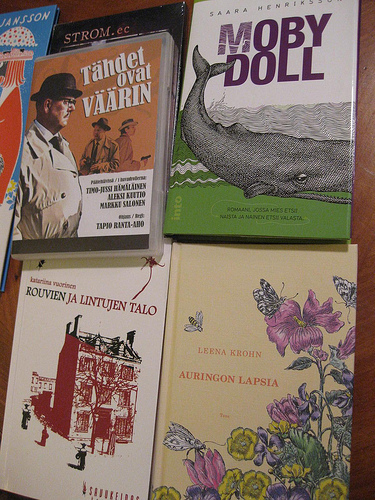
(Some mysterious things brought back from Finland, which will be discussed next week…)
In what ways have you gotten involved over the years?
I've done a lot of things, mostly locally in the Turku region. I served on the boards of the local sf associations for almost two decades (and was the founder of the university sf club), edited the club fanzine for a few years, have helped organize a few Finncons, was one of the organizers of the first Åcon (a smaller and more fannish convention held in the Åland island), have written a couple of articles for different fanzines, and even had a small part in organizing a couple of international conventions (Snorfcon 2 in Sweden in 2005 and the Worldcon in Glasgow in 2005).
Nowadays I blog about the Finnish fandom at Partial Recall, am one of the people who keep the local pub meetings going in Turku (and occasionally publish a fanzine there), and serve as the technical administrator of the Finncon association (maintaining their web and e-mail thingies, to use a technical term).
Why do you think Finnish SF/F readers/fans are so well-organized?
Finland has a long tradition of small and bigger non-profit associations, so this isn't unique to fandom here. But also probably because how fandom got started in Finland—rather late compared to many other countries (fanzines started getting published regularly in the 70s, and conventions started only in the 80s)—and because the persons who were starting it all happened to be quite organized and positive to cooperation by nature. They created a tradition that was easy to follow and that has proven very useful over the years. Although having lots of organizations also has its drawbacks (things sometimes tend to get quite bureaucratic, and it may be difficult to find enough people to man all the needed positions in the organizations), having established organizations has helped a lot getting funding for the Finncons, for example.
How would you describe the SF/F scene in Finland the last few years?
It has remained active. Despite warning calls about graying every now and then, new people are coming in every year. It has also fragmented quite a bit in my opinion: in addition to the traditional fandom with its clubs and zines, new, more independent communities have risen—for example around a web forum, or mainly for younger people. These groups can be somewhat separate from the rest of the fandom and not always all that interested in the "old ways" (instead hanging out in their own groups, doing things they like), but this is just about focusing on the things you want to do; there is still very much cooperation between different groups, and everybody gets along quite well. The national convention is nowadays organized yearly between a few cities, but it is also very much a project of cooperation between many cities (depending on how much help the organizing committee wants and needs, of course).
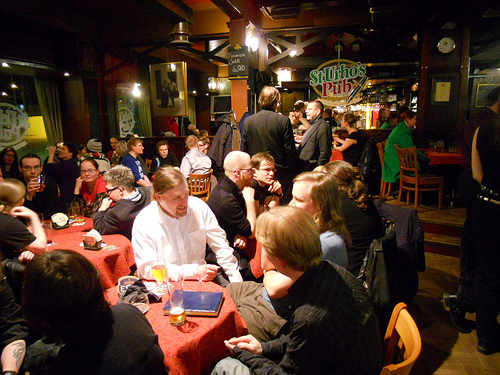
(A photo from our visit to St. Urho's Pub in Helsinki during one of the regular meetings of the main SF/Fantasy club in the city.)
The sf writers scene has, in my opinion, gotten more lively and more varied lately. Quite a few authors who started publishing in the sf club zine circles have published novels and collections (sf and non-sf), both from small presses and major publishing houses. I think the writers have networked quite efficiently, organizing things like workshops, writing camps, etc. At the moment, I think there's quite a spectrum of different stories published—from hard sf to the traditional yarns of the new pulp people to the almost-mimetic fiction of the realfantastik movement, and everything in between—not forgetting the domestic rural fantasy that luckily isn't nearly as dominant any more as it was, or at least felt like, in the late 90s and early 2000.
What has Ton Jerrman and his magazine meant to Finnish SF/F?
A lot. Within fandom, most visibly through the zine Tähtivaeltaja, but also as a fandom active (especially in the early days, including being in the committee of the first-ever Finncon), a critic, an advocate of science fiction and comics, a speaker, and a friend to many in fandom.
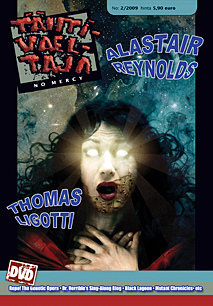
Quoting what I wrote when Tähtivaeltaja hit 100 issues, Tähtivaeltaja has never been content to just tread water, but instead it's been constantly improving and looking for new things (and telling all about them too). Its main emphasis is and has been science fiction, but horror, comics, rock music, and different subcultures have also been strongly represented. Nowadays the zine doesn't contain nearly as many accounts of people drinking booze or Toni raving about crappy gigs of bands nobody has ever heard of as it used to, but the zine is no less interesting. Tähtivaeltaja is _the_ place to look for for information about new and interesting writers from Finland and around the world, upcoming trends in science fiction and fantasy, and informed book reviews.
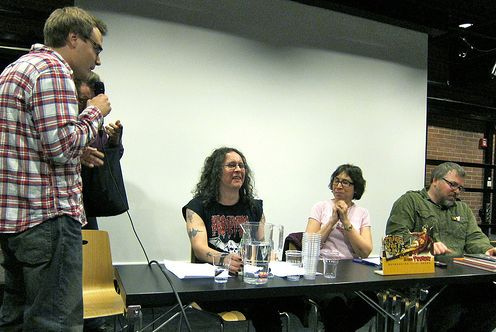
(Translator Juha Tupasela, editor-writer Toni Jerrman, Ann, and me on a panel during Tähtivaeltaja Day, April 16.)
Toni has a very keen critical eye and a vast knowledge of the field, and he doesn't hesitate to put it to use to tell people about how wonderful sf/f can be. But he's also such a colorful personality that I have to say without him the Finnish fandom would also be a lot more boring.
What is the importance of SF/F in your life—and why do you stay so active in the community?
Sf/f is my favorite kind of literature, but that isn't all that important; there are more great books than I ever will be able to read in any genre and style of literature. I'd say the sf fandom has affected me a great lot more. I've met many great friends through fandom (and, as mentioned earlier, even my wife). I like giving back to the community, and I guess I'm just the type of person who enjoys organizing things, but getting to spend time with such a wonderful bunch of people is the biggest reward.
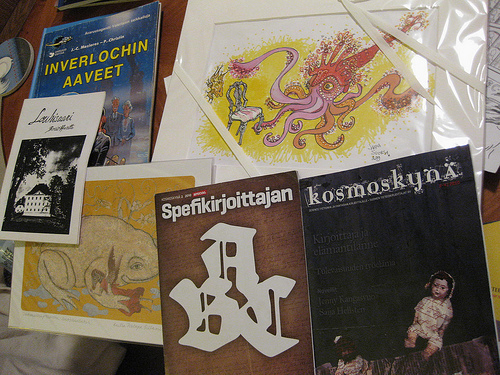
(Finnish SF/F magazines, alongside Finnish art, and a rare chapbook by Finnish writer of the Weird, Boris Hurtta. The squid art is by Jaana Suorsa and the toad with zebra is by Jouto Maassa.)
The Finnish SF/Fantasy Community: An Interview with Tero Ykspetäjä originally appeared on Ecstatic Days on May 5, 2011.
Service Announcements: e-Weird Tales, Beyond Victoriana, Poland, and e-Ephemera
A few things to mention that've slipped away from me a bit. SF Signal recently ran my interview with Polish editor-writer Konrad Walewski, and I've reproduced it above in case you missed it.
Jan Zeranski, an editor and writer in Poland, also sent me these additional links: Katedra and Esensja (both in Polish and, as Jan says, containing "huge database of reviews, interviews and excerpts. Esensja is a monthly semi-pro zine about modern popculture (apart from books they review movies, music and so on) and Katedra focuses on literature." In English, the Book Institute is mostly about mainstream literature and of definite interest. "As for essays or articles I have found only one so far—at Words Without Borders. It's a good text written by Tomasz Kolodziejczak, award-nominee science fiction author and a comic book publisher."
AND, in other news, you can now get Weird Tales electronically!
Also, Beyond Victoriana has a very cool fund-raiser for Japan. Go check it out and donate!
Finally, Neil Williamson, who I interviewed in Warsaw about his projects and about Scottish SF (see below), has an e-book out of his great collection Ephemera. Check it out!
Service Announcements: e-Weird Tales, Beyond Victoriana, Poland, and e-Ephemera originally appeared on Ecstatic Days on May 5, 2011.
May 4, 2011
Shared Worlds Teen SF/Fantasy Writing Camp: You Can Still Apply!
Just a reminder for teens interested in SF/Fantasy writing–you can still sign up for the two-week summer camp Shared Worlds. It's pretty unique. You get one-on-one and group instruction with professional writers, get to build fantasy and science fiction worlds, and write fiction. Along with a lot of other fun stuff. What could be better?
In support of the camp, SF Signal was kind enough to run a MindMeld with a ton of great writers, including Michael Moorcock, Carrie Vaughn, Patrick Rothfuss, and more.
ALSO—the "What's the Craziest or Most Experimental Book You've Ever Read?" post has gotten red-hot after a shout-out from io9, so go check it out again—lots of great, recent recommendations.
Shared Worlds Teen SF/Fantasy Writing Camp: You Can Still Apply! originally appeared on Ecstatic Days on May 4, 2011.
May 3, 2011
What's Your Favorite SF/F Award, and Why?
Just posted to Omnivoracious, the Amazon book blog, my short analysis of various awards during our current Silly Season. Go forth. Signal boost. Answer my questions. Agree with me. Call me fool, idjut, misinformed, prophet—I care not. Just go forth. Have fun. Feeeeeed.
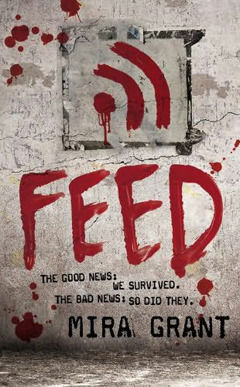
What's Your Favorite SF/F Award, and Why? originally appeared on Ecstatic Days on May 3, 2011.




May 1, 2011
Bosch Museum, Netherlands
A couple of weeks ago editor/writer Jetse DeVries was kind enough to show us around the Bosch museum in Den Bosch, in the Netherlands. Here are a couple photos and a few (at times shaky) videos from within the museum, which occupies a former church and features physical models of creatures from Bosch's paintings, in addition to replicas of his paintings (the originals are in Spain).
Bosch Museum, Netherlands originally appeared on Ecstatic Days on May 1, 2011.




Ann VanderMeer Reads from Michael Cisco's "The Divinity Student"
In Finland, we participated on the last day in a contest at a con that was about convincing an audience to like a book. Most contestants read outrageously or read outrageous texts. Ann, wearing a Tallahassee Tentacles hockey shirt (a surprise from Finnish fandom), chose to read seriously from Michael Cisco's amazing The Divinity Student.
As a bonus of sorts, Juha Tupasela reading the numbers story, "The Man Who Had No Eyes," from City of Saints & Madmen:
Ann VanderMeer Reads from Michael Cisco's "The Divinity Student" originally appeared on Ecstatic Days on May 1, 2011.

